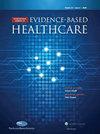Covid-19研究证据:一项国际调查,探讨对有用来源、首选格式和可及性的看法
Q3 Medicine
International Journal of Evidence-Based Healthcare
Pub Date : 2022-03-14
DOI:10.17267/2675-021xevidence.2022.e4010
引用次数: 0
摘要
在大流行期间,决策者、临床医生、患者和公众等利益攸关方需要以可理解和适用的格式获得高质量、及时和相关的研究证据。目的:通过一项在线调查,确定全球受众在哪里找到有关COVID-19的研究证据,以及他们倾向于如何跟上最新情况。方法和材料:我们对对英语和西班牙语研究感兴趣的人进行了在线调查。我们使用了访问Cochrane网站和社交媒体账户的人作为方便样本,Cochrane是一个整理研究系统评论的国际组织。结果:831名不同角色和地点的人在短时间内回应,很少积极推广。医疗保健专业人员、公众和政策影响者希望获得研究证据,为有关COVID-19的决策提供信息。超过一半的人认为来自政府网站(52%)、国际组织(57%)、期刊(56%)和证据整理组织(60%)的研究证据很有用。人们想要关于COVID-19的研究证据格式,如外行摘要(60%)、在线系统评论(60%)、带评论的简短摘要(51%)和视觉摘要(48%)。人们更喜欢通过电子邮件更新和根据个人兴趣定制的新闻通讯(34%)、传统媒体(13%)和社交媒体(12%)来了解最新的COVID-19研究。结论:采用简单的在线调查方法快速收集反馈是可行的。官方组织的网站是COVID-19研究证据的主要来源。需要对如何最好地提供易于获取和理解的证据进行更多的研究。本文章由计算机程序翻译,如有差异,请以英文原文为准。
Covid-19 research evidence: An international survey exploring views on useful sources, preferred formats, and accessibility
INTRODUCTION: In a pandemic, stakeholders such as policy makers, clinicians, patients, and the public need access to high-quality, timely, relevant research evidence in a format that is understandable and applicable. OBJECTIVES: An online survey was used to determine where a global audience finds research evidence about COVID-19 and how they prefer to keep up to date. METHODS AND MATERIALS: We conducted an online survey of people interested in research in English and Spanish. We used a convenience sample of people visiting websites and social media accounts of Cochrane, an international organisation that collates systematic reviews of research. RESULTS: 831 people with various roles and locations responded over a short period with little active promotion. Healthcare professionals, members of the public, and policy influencers wanted research evidence to inform decisions about COVID-19. More than half found research evidence from government websites (52%), international organisations (57%), journals (56%), and evidence collation organisations (60%) useful. People wanted research evidence about COVID-19 formats such as lay summaries (60%), online systematic reviews (60%), short summaries with commentaries (51%), and visual summaries (48%). People preferred to be kept up to date about COVID-19 research via email updates and newsletters, tailored to people’s interests (34%), traditional media (13%) and social media (12%). CONCLUSIONS: It was feasible to collect feedback rapidly using a simple online survey. Websites from official organisations were key sources of COVID-19 research evidence. More research is needed on how best to provide evidence that is easy to access and understand.
求助全文
通过发布文献求助,成功后即可免费获取论文全文。
去求助
来源期刊

International Journal of Evidence-Based Healthcare
Medicine-Health Policy
CiteScore
1.80
自引率
0.00%
发文量
39
期刊介绍:
The International Journal of Evidence-Based Healthcare is the official journal of the Joanna Briggs Institute. It is a fully refereed journal that publishes manuscripts relating to evidence-based medicine and evidence-based practice. It publishes papers containing reliable evidence to assist health professionals in their evaluation and decision-making, and to inform health professionals, students and researchers of outcomes, debates and developments in evidence-based medicine and healthcare.
The journal provides a unique home for publication of systematic reviews (quantitative, qualitative, mixed methods, economic, scoping and prevalence) and implementation projects including the synthesis, transfer and utilisation of evidence in clinical practice. Original scholarly work relating to the synthesis (translation science), transfer (distribution) and utilization (implementation science and evaluation) of evidence to inform multidisciplinary healthcare practice is considered for publication. The journal also publishes original scholarly commentary pieces relating to the generation and synthesis of evidence for practice and quality improvement, the use and evaluation of evidence in practice, and the process of conducting systematic reviews (methodology) which covers quantitative, qualitative, mixed methods, economic, scoping and prevalence methods. In addition, the journal’s content includes implementation projects including the transfer and utilisation of evidence in clinical practice as well as providing a forum for the debate of issues surrounding evidence-based healthcare.
 求助内容:
求助内容: 应助结果提醒方式:
应助结果提醒方式:


